- Online car rental since 2005
- Popular countries
- Popular regions
- Popular cities
- Popular airports
- Car Rental Italy
- Car Rental Spain
- Car Rental United States
- Car Rental Portugal
- Car Rental South Africa
- Car Rental France
- Car Rental Netherlands
- Car Rental Germany
- Car Rental United Kingdom
- Car Rental Greece
- Car Rental Austria
- Car Rental Switzerland
- Car Rental Croatia
- Car Rental Belgium
- Car Rental Norway
- Car Rental Ireland
- Car Rental Denmark
- Car Rental Australia
- Car Rental Canada
- Car Rental Sweden
- Car Rental Florida
- Car Rental England
- Car Rental California
- Car Rental Sicily
- Car Rental Mallorca
- Car Rental Tenerife
- Car Rental Sardinia
- Car Rental Ibiza
- Car Rental Madeira
- Car Rental Crete
- Car Rental Gran Canaria
- Car Rental Scotland
- Car Rental Azores
- Car Rental Malta
- Car Rental Corsica
- Car Rental Lanzarote
- Car Rental Fuerteventura
- Car Rental Rhodes
- Car Rental Corfu
- Car Rental La Palma
- Car Rental Amsterdam
- Car Rental Milan
- Car Rental Miami
- Car Rental Lisbon
- Car Rental Malaga
- Car Rental Porto
- Car Rental Cape Town
- Car Rental Rome
- Car Rental Alicante
- Car Rental Bergamo
- Car Rental Barcelona
- Car Rental London
- Car Rental Faro
- Car Rental Orlando
- Car Rental Munich
- Car Rental Vienna
- Car Rental Nice
- Car Rental Johannesburg
- Car Rental Bari
- Car Rental Madrid
- Car Rental Amsterdam Schiphol Airport
- Car Rental Miami International Airport
- Car Rental Lisbon Airport
- Car Rental Malaga Airport
- Car Rental Porto Airport
- Car Rental Milan Malpensa Airport
- Car Rental Alicante Airport
- Car Rental Rome Fiumicino Airport
- Car Rental Bergamo Airport
- Car Rental Faro Airport
- Car Rental Cape Town Airport - International Terminal
- Car Rental Orlando International Airport
- Car Rental Barcelona Airport
- Car Rental Vienna Airport
- Car Rental Munich Airport
- Car Rental Mallorca Airport
- Car Rental Bari Palese Airport
- Car Rental Nice Airport
- Car Rental Bologna Airport
- Car Rental Los Angeles International Airport
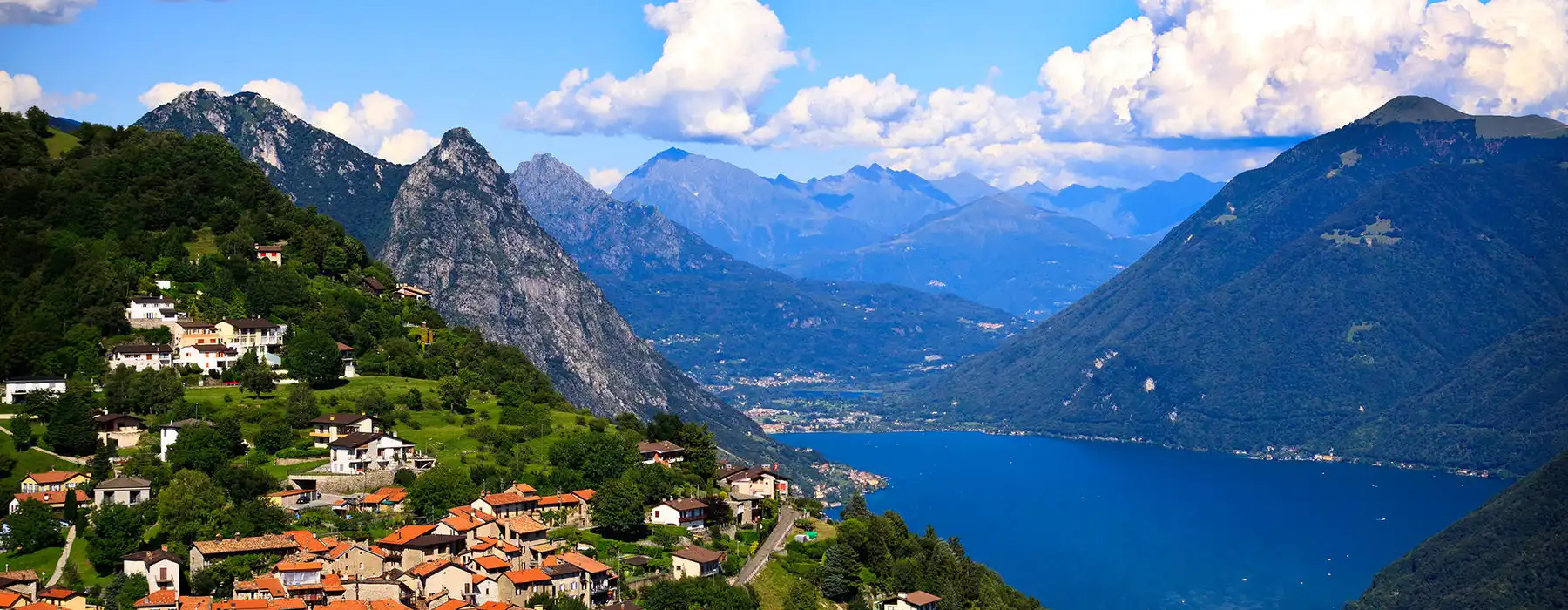
Car Rental Switzerland
Save time and money. We compare the offers of car rental companies in Switzerland on your behalf.
- Free cancellation Up to 48 hours prior to the scheduled pick-up time
- Best price guarantee Have you found a better price? Let us know and we will make you a better offer.
- 24000+ pick-up locations Locations around the world

Car Rental Switzerland
EasyTerra Car Rental Switzerland is an independent car rental comparison site. Our site compares prices from well-known car rental companies so that, as a customer, you can always reserve your car with us at a competitive rate.
Car rental offers in Switzerland
Whether you're looking for a small rental car or a station wagon for the entire family, we will always have a suitable vehicle at the lowest price. Below are some examples from our selection in Switzerland.

-
Dollar Rent a Car From€ 22 /day -
Thrifty From€ 22 /day -
Hertz From€ 27 /day

-
Europcar From€ 23 /day -
Thrifty From€ 25 /day -
Keddy By Europcar From€ 27 /day

-
Thrifty From€ 28 /day -
Hertz From€ 34 /day -
Dollar Rent a Car From€ 36 /day

-
Green Motion From€ 27 /day -
Unirent Car Rental From€ 35 /day -
Budget From€ 36 /day

-
Alamo From€ 27 /day -
National Car Rental From€ 36 /day -
Enterprise From€ 37 /day

-
Thrifty From€ 28 /day -
Europcar From€ 30 /day -
Keddy By Europcar From€ 32 /day

-
Budget From€ 28 /day -
Avis From€ 30 /day

-
Alamo From€ 29 /day -
Enterprise From€ 41 /day -
National Car Rental From€ 47 /day

-
Hertz From€ 31 /day -
Thrifty From€ 37 /day -
Dollar Rent a Car From€ 37 /day

-
Europcar From€ 21 /day -
Keddy By Europcar From€ 25 /day

-
Dollar Rent a Car From€ 22 /day -
Thrifty From€ 22 /day -
Europcar From€ 23 /day

-
Thrifty From€ 28 /day -
Europcar From€ 30 /day -
Keddy By Europcar From€ 32 /day

-
Thrifty From€ 22 /day -
Hertz From€ 29 /day

-
Europcar From€ 23 /day -
Keddy By Europcar From€ 40 /day

-
Thrifty From€ 28 /day -
Hertz From€ 44 /day

-
Europcar From€ 26 /day -
Unirent Car Rental From€ 29 /day -
Green Motion From€ 29 /day

-
Alamo From€ 27 /day -
Hertz From€ 31 /day -
Budget From€ 31 /day

-
Alamo From€ 29 /day -
Hertz From€ 31 /day -
Dollar Rent a Car From€ 37 /day

-
Europcar From€ 24 /day -
Keddy By Europcar From€ 27 /day -
Alamo From€ 31 /day

-
Thrifty From€ 25 /day -
Hertz From€ 36 /day

-
Thrifty From€ 31 /day -
Hertz From€ 48 /day

-
Europcar From€ 26 /day -
Keddy By Europcar From€ 44 /day

-
Dollar Rent a Car From€ 26 /day -
Thrifty From€ 26 /day -
Hertz From€ 31 /day

-
Hertz From€ 31 /day -
Dollar Rent a Car From€ 39 /day -
Thrifty From€ 39 /day

-
Europcar From€ 27 /day -
Thrifty From€ 29 /day -
Alamo From€ 31 /day

-
Europcar From€ 28 /day -
Keddy By Europcar From€ 31 /day -
Flizzr From€ 39 /day

-
Hertz From€ 32 /day -
Thrifty From€ 32 /day -
Dollar Rent a Car From€ 42 /day

-
Sixt From€ 34 /day

-
Budget From€ 35 /day -
Avis From€ 55 /day

-
Hertz From€ 39 /day -
Dollar Rent a Car From€ 49 /day -
Thrifty From€ 51 /day

-
Europcar From€ 35 /day -
Keddy By Europcar From€ 37 /day -
Alamo From€ 38 /day

-
Dollar Rent a Car From€ 35 /day -
Hertz From€ 45 /day -
Thrifty From€ 47 /day

-
Alamo From€ 42 /day -
Hertz From€ 48 /day -
Dollar Rent a Car From€ 48 /day

-
Avis From€ 37 /day -
Sixt From€ 67 /day

-
Unirent Car Rental From€ 37 /day -
Green Motion From€ 38 /day -
Alamo From€ 42 /day

-
Dollar Rent a Car From€ 42 /day -
Thrifty From€ 42 /day -
Hertz From€ 50 /day

-
Hertz From€ 32 /day -
Dollar Rent a Car From€ 38 /day -
Thrifty From€ 38 /day

-
Hertz From€ 32 /day -
Thrifty From€ 39 /day -
Dollar Rent a Car From€ 40 /day

-
Hertz From€ 33 /day -
Dollar Rent a Car From€ 40 /day -
Thrifty From€ 40 /day

-
Hertz From€ 33 /day -
Thrifty From€ 41 /day -
Dollar Rent a Car From€ 41 /day

-
Green Motion From€ 35 /day -
Alamo From€ 55 /day -
Enterprise From€ 57 /day

-
Green Motion From€ 36 /day

-
Hertz From€ 37 /day -
Dollar Rent a Car From€ 50 /day -
Thrifty From€ 52 /day

-
Alamo From€ 37 /day -
Budget From€ 51 /day -
Enterprise From€ 54 /day

-
Hertz From€ 40 /day

-
Alamo From€ 44 /day -
National Car Rental From€ 52 /day -
Enterprise From€ 63 /day

-
Sixt From€ 44 /day -
Hertz From€ 58 /day -
Alamo From€ 64 /day

-
Europcar From€ 54 /day

-
Europcar From€ 47 /day -
Alamo From€ 210 /day -
Enterprise From€ 210 /day

-
Budget From€ 48 /day

-
Hertz From€ 58 /day -
Sixt From€ 67 /day -
Alamo From€ 70 /day

-
Europcar From€ 50 /day

-
Hertz From€ 51 /day

-
Hertz From€ 58 /day

-
Alamo From€ 43 /day -
Avis From€ 53 /day -
National Car Rental From€ 59 /day

-
Alamo From€ 44 /day -
Budget From€ 47 /day -
Avis From€ 53 /day

-
Budget From€ 47 /day -
Green Motion From€ 58 /day -
Alamo From€ 63 /day

-
Budget From€ 45 /day

-
Europcar From€ 45 /day

-
Budget From€ 49 /day -
Hertz From€ 65 /day -
Sixt From€ 79 /day

-
Budget From€ 46 /day -
Green Motion From€ 52 /day -
Alamo From€ 61 /day

-
Budget From€ 47 /day -
Avis From€ 53 /day -
Hertz From€ 65 /day

-
Budget From€ 49 /day -
Avis From€ 52 /day -
Alamo From€ 79 /day

-
Dollar Rent a Car From€ 29 /day -
Thrifty From€ 32 /day -
Hertz From€ 35 /day

-
Thrifty From€ 32 /day -
Dollar Rent a Car From€ 41 /day -
Hertz From€ 43 /day

-
Thrifty From€ 37 /day -
Alamo From€ 44 /day -
Hertz From€ 44 /day

-
Green Motion From€ 33 /day -
Alamo From€ 41 /day -
Enterprise From€ 43 /day

-
Green Motion From€ 33 /day

-
Thrifty From€ 38 /day -
Dollar Rent a Car From€ 47 /day -
Hertz From€ 49 /day

-
Unirent Car Rental From€ 36 /day -
Europcar From€ 40 /day

-
Unirent Car Rental From€ 37 /day -
Europcar From€ 44 /day -
Sixt From€ 44 /day

-
Green Motion From€ 42 /day

-
Alamo From€ 50 /day -
Enterprise From€ 62 /day -
National Car Rental From€ 62 /day

-
Europcar From€ 64 /day

-
Hertz From€ 69 /day -
Europcar From€ 74 /day -
Budget From€ 82 /day

-
Europcar From€ 65 /day -
Budget From€ 65 /day -
Hertz From€ 69 /day

-
Europcar From€ 71 /day

-
Europcar From€ 73 /day

-
Budget From€ 79 /day -
Avis From€ 88 /day -
Sixt From€ 96 /day

-
Hertz From€ 73 /day -
Budget From€ 80 /day

-
Alamo From€ 74 /day -
Enterprise From€ 75 /day -
National Car Rental From€ 76 /day

-
Hertz From€ 60 /day

-
Sixt From€ 63 /day

-
Hertz From€ 66 /day

-
Hertz From€ 65 /day

-
Hertz From€ 69 /day

-
Sixt From€ 80 /day

-
Hertz From€ 83 /day

-
Hertz From€ 82 /day -
Sixt From€ 129 /day

-
Sixt From€ 85 /day

-
Thrifty From€ 25 /day -
Hertz From€ 36 /day

-
Thrifty From€ 31 /day

-
Hertz From€ 34 /day -
Avis From€ 37 /day -
Europcar From€ 39 /day

-
Green Motion From€ 35 /day -
Alamo From€ 37 /day -
Avis From€ 40 /day

-
Hertz From€ 35 /day -
Budget From€ 51 /day -
Alamo From€ 52 /day

-
Green Motion From€ 36 /day -
Thrifty From€ 46 /day -
Dollar Rent a Car From€ 46 /day

-
Hertz From€ 39 /day

-
Sixt From€ 37 /day

-
Green Motion From€ 37 /day -
Flizzr From€ 57 /day -
Sixt From€ 63 /day

-
Europcar From€ 21 /day -
Keddy By Europcar From€ 25 /day

-
Thrifty From€ 22 /day -
Hertz From€ 29 /day

-
Thrifty From€ 28 /day -
Hertz From€ 44 /day

-
Europcar From€ 23 /day -
Keddy By Europcar From€ 40 /day

-
Europcar From€ 24 /day -
Keddy By Europcar From€ 27 /day

-
Thrifty From€ 31 /day -
Hertz From€ 48 /day

-
Thrifty From€ 25 /day -
Hertz From€ 36 /day

-
Europcar From€ 26 /day -
Keddy By Europcar From€ 44 /day

-
Hertz From€ 32 /day -
Thrifty From€ 39 /day -
Dollar Rent a Car From€ 40 /day
Popular cities in Switzerland
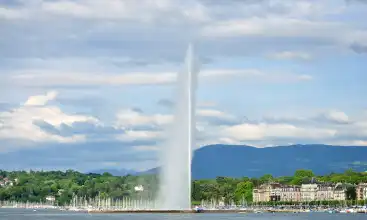
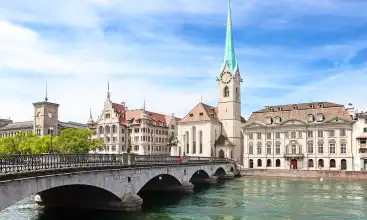
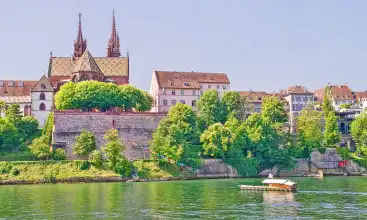

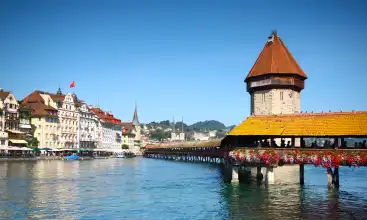

Popular rental locations in Switzerland
-
Car Rental Geneva Airport (Switzerland)From
€ 31 /day -
Car Rental Zürich AirportFrom
€ 26 /day -
Car Rental Geneva Airport (France)From
€ 21 /day -
Car Rental Basel AirportFrom
€ 31 /day -
Car Rental Lucerne Train Station
-
Car Rental Sion Train Station
-
Car Rental Basel Train Station
-
Car Rental Visp Train Station
Useful tips for a well-prepared trip
Which insurance should I choose, and what's the deal with the deposit? Read our articles with useful information and tips to ensure you choose the right rental car for you.
Car rental locations in Switzerland
EasyTerra Car Rental compares rental car prices at the following destinations

Location information for Switzerland
Switzerland is best explored by rental car. EasyTerra Car Rental has over 69 pick-up locations in Switzerland. This means there is always a pick-up location close to your destination.
Most popular car hire locations in Switzerland
Introduction
Switzerland is a relatively small country in the centre of Europe. Officially Switzerland does not have a capital. Since 1848 the federal city is Bern. The architecture in the heart of the city is of monumental value. Other famous Swiss cities are Geneva, Zürich and Basel.
Tourists principally visit Switzerland to admire the beautiful nature. The magnificent Alps are well-attended. The three peaks of the Eicher, Mönch and Jungfrau form a idyllic picture and are usually mentioned together. Hikers can really let themselves go in the alpine meadows and mountain tracks, not only because of the lovely routes, but also because of the clean air. The clear blue Swiss lakes with their ice cold water are a feast for the eye. Furthermore, Switzerland is a popular destination for winter sports. Every year, many skiers and snowboarders are drawn to the slopes to live it up in the snow. Famous ski resorts are Davos, Sankt Moritz and Zermatt. Switzerland is a thriving, beautiful and, especially in winter, a very sociable country.
History
In 1291 the federal state of Switzerland came into existence. The three rural communes Uri, Schwyz and Unterwalden, founded a confederation from which present day Switzerland would evolve.
Before this time, in the Stone Age, tribes inhabited the area around the current city Chur. Some of the remains that are found there are eleven thousand years old. Other treasures date from around 3800 BC. The area has been continuously inhabited for a long time. The Stone Age, Copper Age and Bronze Age, all saw various peoples come and go. Most of them were hunter-gatherers.
Hevetii, Lepontii, Sadunia and Raetians found their way into the mountains and made it their home. Around 1500 BC Celtic tribes settled in various parts of present day Switzerland. In the first centuries BC the Helvetii tried to conquer Gallia. However, they were beaten and sent back by Julius Caesar.
During the first century after Christ, the Alps came under the reign of the Roman Emperor. This had big consequences for the culture which became Romanized. Present day Avenches, in the canton of Vaud, became the administrative centre of the Romans. Still today one can admire the amphitheatre in Avenches.
In the third century AD the flat areas of Switzerland became occupied by the Alamanni. The Gallo-Roman tribes withdrew into the mountains. This is how the German language was introduced in Switzerland and how the Romansh language disappeared from the Alps.
Christianity found its way to the Swiss region in the fourth century. The first churches were built and the first bishoprics were founded in Geneva, Basel and Sion. Until the seventh century the various groups of Alamanni in the eastern part of Switzerland kept their own religion. They worshipped gods like Wodan and Thor.
The Roman Empire had fallen and the Burgundian kings ruled over Switzerland. Then the Franks drove them away. Under the rule of the Carolingians the Treaty of Verdun was made. From that moment Burgundy, Lorrain and Alemannia were all part of the Holy Roman Empire.
In the tenth century the power of the Carolingians waned. Saracens and Magyars sacked cities like Basel and St. Gallen. Otto I defeated the Magyars in 955. He integrated the areas into his Holy Roman Empire.
During the eleventh century the Zähringens founded cities such as Bern, Thun, Murten and Fribourg. When, at the beginning of the thirteenth century the Zähringen dynasty ended, the House of Habsburg competed with the Kyburgians over the regions. Eventually the Habsburgians won.
In 1291 the before mentioned cantons Uri, Schwyz and Unterwalden revolted against the House of Habsburg. Allied by their Swiss Federal Charter they defeated the Habsburgian army. In the following century Zürich and Bern joined the confederation. In 1499 the Swiss obtained their independence from the Holy Roman Empire.
The sixteenth century saw the voluntary and involuntary establishment of the other cantons. During this century, the reformation was put into motion by Zwingli. He died in a reformation war in 1531. Hereafter, the principle of freedom of religion was introduced. Because of this Catholicism returned to Switzerland.
In 1541 the reformation revived under the leadership of John Calvin. This led to the Synod of Dort in 1618 and 1619. The Canons of Dort was adopted, which still is the foundation for reformed churches.
In 1648, at the Peace of Westphalia, Switzerland officially obtained independence from the Holy Roman Empire, though in practice it had had this for a long time already. Switzerland became a federation.
The French Revolution involved Switzerland in its fights. The French overran their neighboring country and declared the Helvetic Republic in 1798. The cantons were dissolved, though this was met with great resistance. At the Congress of Vienna in 1815, Switzerland officially regained its independence.
Peace was restored but only for a moment. In 1847 war broke out between the protestant and catholic cantons. Within a month it was soothed. This war may have lasted just shortly, but led to a federal constitution in 1848, in which trade, legislation and the military came under the jurisdiction of the federal government, while most other issues from then on were to be settled autonomously by the cantons. The constitution was a success and from then on the Swiss federation flourished.
During the two World Wars, Switzerland kept its neutrality. The Germans had plans on invading Switzerland in the Second World War, but never actually did so.
In 2002 Switzerland joined the United Nations. Switzerland is not a member of the European Union. In 2005 it signed the Schengen Agreement and the Dublin Convention.
Society and culture
Switzerland has some 7.5 million inhabitants. A fifth of the population does not originate from Switzerland. Important minorities in Switzerland are the Serbo-Croatians, Albanians and Turks.
The cantons of the Swiss plateau are the most populous. Here, most inhabitants are protestant. In the Alps live considerably less Swiss. The economy of this region is primarily based on agriculture. Catholicism is widely spread here. More than forty percent or the population is catholic. Just about the same amount of Swiss is protestant. Other religions that are represented in Switzerland are Buddhism, Islam and Judaism.
There are four official languages. For more than sixty percent of the population German is their mother tongue. This German language is called Swiss German and deviates a lot from the High German as taught in Germany. Twenty percent of the Swiss speaks French. Italian is spoken by 6.5 percent and Romansh is spoken by 0.5 percent. This last group of people lives mainly in part of the canton Graubünden.
The Swiss yodeling is practiced primarily in the mountain regions at folkloric events. Sometimes the alphorn accompanies the yodeling. The Swiss are famous for their discipline. Tidiness is also important to the Swiss.
Political situation
Switzerland is a democratic federal republic. The country is divided in 26 official cantons. These are largely autonomous. Every canton has its own constitution and legal system. In addition to this, there is also on canton level a government and parliament.
The national Swiss parliament consists of two chambers. The National Council has two hundred members. The division is representative for the amount of inhabitants per canton. The second chamber is the Swiss Council of States, which has 46 members. Every canton is represented by two members in this council. The six half-cantons are represented by one councilor.
The Swiss government has seven ministers. The government is called Swiss Federal Council. The parliament chooses the Federal Council. The president of Switzerland is chosen by the parliament for a period of one year. The president chairs the Federal Council.
Economy
The Swiss economy is one of the most capitalistic in the world. The standard of living is generally high in Switzerland. Important economic sectors are banking, chemical and pharmaceutical industry and tourism among others.
The financial sector is mainly concentrated in Zürich, Geneva and Lugano. In Basel the chemical, pharmaceutical and biotechnological industry is concentrated.
Switzerland attracts many motorcyclists and hikers. In the winter swarms of people are drawn to the Alps for winter sports.
In Switzerland the currency is the Swiss Franc.
Geography and climate
Switzerland lies in the centre of Europe, surrounded by France, Germany, Austria, Liechtenstein and Italy. The country is mountainous and occupies 41.290 square kilometers. Switzerland is the Alp country. This mountain range stretches from the south to south east and covers half of the country. The highest mountain is the 4634 meters high Dofauspitze. Though the most famous mountain is the Matterhorn. This one is 4478 meters high. In the northwest lies the Jura. This is a smaller mountain range that continues in France. The mountains of the Jura end in the Swiss Plateau. The river Rhine forms the natural border with Germany in the north. At Schaffhausen the river roars into Germany with magnificent waterfalls. The Rhone and Aare also flow through Switzerland. Germany and Switzerland share Lake Constance, or the Bodensee as it is called in German. Other big lakes in Switzerland are the Lake Geneva, Lake Neuchâtel and Lake Lucerne.
Apart from the Jura and Alp regions, there are two other landscapes in Switzerland. The before mentioned Swiss Plateau lies between the Jura and the Alps. The area stretches from Lake Geneva to the Bodensee. The high plateau knows hills between four hundred and six hundred meters. The hills are covered with meadows and forests. The region covers almost one third of the country. Most Swiss live in this part. Large cities such as Zürich, Geneva and Bern are located on the plateau. North-west Switzerland lies above the Jura and covers only one tenth of the entire country. The famous city of Basel lies here.
The Swiss climate varies considerably between the different regions. The summers are generally warm with some rainfall here and there. In winter the mountains are covered with snow. The weather conditions might change here suddenly. In lower parts of the county the winters are less cold, but more cloudy.
The foehn is a warm Mediterranean wind that may spring up in summer. In autumn there is usually the least precipitation.
Traffic and infrastructure
The road network of Switzerland is excellent. Roads are well kept and in general not too busy. The road signs are very clear as well. On nearly all freeways one is obliged to possess an emblem. Besides this, at certain mountain passes toll is levied. One can drive 120 km/h on highways. Inside the built-up area 50 km/h is the limit and outside the built-up area one can drive 80 km/h.
Travelling by bus is a good option in Switzerland. In towns as well as between cities and villages buses run frequently.
The train network of Switzerland is extensive. Travelling by train is fast and very comfortable. The trains are clean, they go frequently and the time tables are reliable.
Big international airports are Zürich International Airport and Geneva Airport. Travelers can also enter and leave Switzerland from Basel Airport, Bern Airport and Lugano Airport. Basel Airport has the special quality of being Swiss as well as French.
Food and drink
Famous Swiss dishes are rösti and raclette. Rösti is a dish that originates from the German speaking part of Switzerland. In the canton of Bern farmers used to eat this for breakfast. It consists of rasped potatoes which are baked in a round form. Bacon, cheese, apple or onion may be added. Especially the Swiss cheeses are appreciated around the world. Famous types are Emmental, Gruyère and Appenzeller. Swiss chocolate has been produced from the eighteenth century onwards.
In the valley in the south of Switzerland the climate is favorable to wine growing. Especially in the canton and around Lake of Geneva there is a lot of winegrowing. The cantons of Vaud, Neuchâtel and Bern also produce wines. Swiss wines are not praised highly. The wines are predominantly consumed in Switzerland.
Time zone
In Switzerland the time is GMT/UTC +1. In summer the clock is turned forward to GMT/UTC +2.
Accommodation
There are plenty of hotels. Even guests with special wishes have the opportunity to choose from a variety of hotels. Some of the hotels in Switzerland are known for their beautiful, idyllic location. Others are attractive to parents with children. Budget hotels and luxurious hotels, a place to sleep in a hotel chain or a family hotel; it is all possible.
Bed & Breakfasts are very popular as well in Switzerland. The classification system uses five stars, similar to the system used for hotels. Guesthouses are frequently offered by private persons. Sometimes it is also possible to spend the night at a farm.
One can find hostels, in all larger cities such as Basel, Bern and Zürich, but also in well-known ski resorts. There are almost sixty hostels in Switzerland. Some are located in nice old farmhouses, others in modern buildings. In the rural areas, in the mountains and in cities, travelers can always spend the night in one of the hostels. Some monasteries also offer a place to spend the night.
Swiss camp sites are generally well-cared for and are often located at beautiful spots.
External sources
For more information about Switzerland we recommend Google and the following sources:
Practical information
-
CurrencySwiss franc
-
Driving directionRight
-
City speed limit50 km/h
-
Freeway speed limit80 km/h
-
LanguageGerman, French, Italian
-
Popular car categoryCompact
What most people want to know
The following questions and answers are a selection of the most popular questions. If you do not find the answer to your question, have a look at the Frequently Asked Questions page or contact us.
- Unirent Car Rental
- Avis
- Europcar
- Budget
- Hertz
- Thrifty
- Enterprise
- Dollar Rent a Car
- Keddy By Europcar
- Sixt
- Flizzr
- National Car Rental
- Alamo
- Green Motion
- Red Spot Car Rental
- RPS Luxe
- Elite (Luxury)
- Acarent
- AVIS Car-Away
- RentScape
- McRent
- CITROEN
- AbsoluteCar
- Your Rent
- Edel & Stark
- FireFly Car Rental
- NÜ Car Rentals
- Advantage Rent a Car



